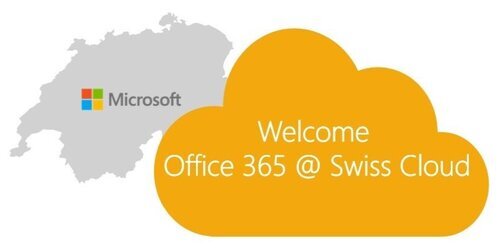Whether private or business - we all live in the cloud. But what does it mean in concrete terms to leave your business data completely in the hands of Microsoft? And what will change when Microsoft offers its Office 365 on its own data centers in Switzerland, which provide local and geo-redundant data residency?
Back in the summer, we reported that the Microsoft Cloud will move into Switzerland in 2019. Recently, we were able to hold an exciting event with customers and prospects where everything revolved around this topic - with a focus on Office 365, which has been available for a few days now.
Our conclusion: Whether in terms of productivity, efficiency or innovation, data management using cloud technology is the future. According to our CEO and founder Reto Meneghini, the infrastructure and organization behind the MS Azure and Office 365 Cloud is beyond all doubt. The security offered - the combination of confidentiality, integrity and resilient availability - is significantly higher than companies can achieve on their own. From now on, Swiss companies will also benefit from the cloud solution – with Swiss data centers. Find out about the most important changes here.
Primo Amrein, Cloud Lead, Microsoft Switzerland
Your advantages with the Swiss Office 365
More productivity, efficiency, security - or simply put flexible scalability? The benefits of the functions that are gradually being rolled out in the Swiss Microsoft Cloud are many. Primo Amrein, Cloud Lead of Microsoft Switzerland, tells us directly about the latest developments.
As in other countries, Microsoft is building a cloud setup in Switzerland - with two geo-redundant data centers in Zurich and Geneva, where customer data is mirrored. The concept is that customers can store their data in the Microsoft cloud without leaving the country. The various services are currently being rolled out step by step. This will be of particular benefit to regulated industries that want to take advantage from Microsoft 365 security and compliance standards while at the same time rely on local data residency. Office 365 is now available. Dynamics 365 and the Power Platform will follow in the course of the next few months.
Your advantages with the Swiss Microsoft Cloud:
Contractual obligation that customer data ‘at rest’ remain securely in Switzerland
Faster server access due to lower latency values (the actual speed boost depends on the actual network situation)
Office 365 pricing will continue to be offered by EU data centres (higher prices will be charged for Azure services)
The same compliance standards as Microsoft worldwide
Up in the Sky is down to Earth!
Where data is involved, there is also the potential for legal conflict. Klaus Krohmann, lawyer at BDO AG, shares his views on the legal aspects of this topic for Swiss companies and authorities: Basically, it is striking how unproblematic the Swiss Cloud is from a legal point of view - and that significant advantages can result from it.
Retention regulations: A Swiss cloud offers the advantage that data can be delivered to Swiss authorities at any time and the functions of the cloud technology can be used. This is of particular benefit to government agencies, which can now also store sensitive data in the cloud.
Data protection: The more sensitive the personal data, the more risky it is to store data abroad. This is a major advantage for a Swiss data residence. It also eliminates the need to inform people where their data is stored.
Disclosure obligations: Local data storage has advantages, particularly in administrative proceedings, civil disputes and criminal proceedings. Access is easier and cheaper within Switzerland.
Klaus Krohmann, Lawyer, BDO AG
CLOUD Act & Data Cloud: What does the law mean for the cloud?
In European countries like Switzerland, different legal norms apply than in the United States. What is new is the potential for conflict that every new transnational technology brings with it on the subject of data protection. One example is the so-called CLOUD Act ("Clarifying Lawful Overseas Use of Data"). This is an American law of 23 March 2018, which, despite its abbreviation, has nothing to do with the data cloud, but is aimed at the handling of data overseas. According to this law, IT service providers such as Microsoft are subject to an obligation to surrender data and must give US authorities access to stored data - even if the data is located outside the USA. The enforceability of this US law in other countries such as Switzerland, where in some cases contradictory legal norms apply, is highly controversial. This means that it is unclear how corresponding US criminal threats would result - regardless of whether the data is stored in the cloud or on an on-premise server.
Ultimately, each company must decide for itself how to deal with such legal uncertainties.
Would you like to learn more about Microsoft Swiss Cloud with Office 365? We would be happy to talk to you.




